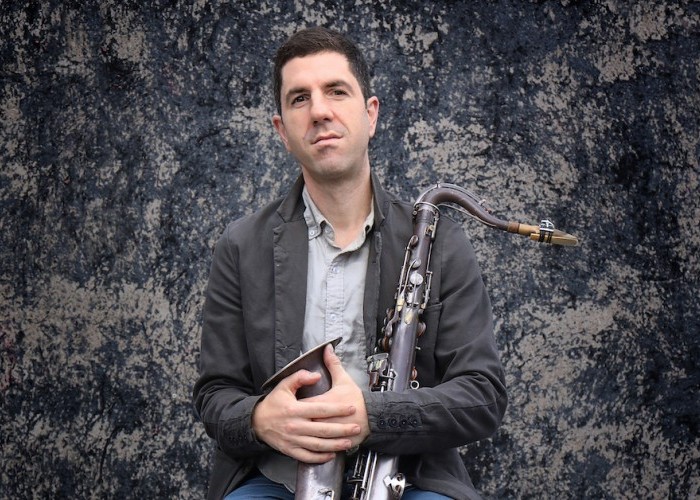Jan 13, 2026 2:09 PM
More Trump-Kennedy Center Cancellations
The fallout from the renaming of the John F. Kennedy Center for the Performing Arts to include President Donald…

Dan Blake’s jazz life is much inspired by his activist efforts.
(Photo: Christopher Drukker)Saxophonist-composer Dan Blake has long been entrenched in the jazz world. But, more recently, he’s begun to engage deeply with several activist movements by way of his long-time study of Buddhism.
Specifically, Blake strives to live a life of compassionate action, a Buddhist teaching that emphasizes giving without the expectation of getting something in return. This idea motivates his social activism around food insecurity and climate change, and inspired his latest album, Da Fé (Sunnyside). The recording features pianist Carmen Staaf, bassist Dmitry Ishenko, drummer Jeff Williams and pianist Leo Genovese.
“I am trying to respond to the inspiration that I’ve received from the masters in jazz music,” Blake said. “There’s an urgency to this music that has always been so inspiring to me, and I have recently, in the last five years, started to connect this urgency more to the work of movement organizers who are working urgently to address very serious existential problems.”
Blake’s journey to discovery began nine years ago, when an interest in Buddhist meditation that developed during his college years led him to a volunteer opportunity.
“[Meditation] had very little to do with music [at first],” he said. “It was a separate sphere. But [in 2008], this new organization, Buddhist Global Relief, was formed, and a few years later, some members of the meditation group I was going to were like, ‘Does anyone want to volunteer?’ I said, ‘Well, I’m in this band — I’ll ask if the band wants to come play a benefit concert for Buddhist Global Relief.’ And, we did.”
Since that performance, Blake has organized nine benefit shows called “Concert to Feed the Hungry” for Buddhist Global Relief. He has also become a board member of the organization.
In addition, Blake has become involved with organizations like Extinction Rebellion, which aims to encourage government action against climate change through the use of nonviolent civil disobedience.
As Blake’s life starts to revolve more around giving back, he’s found it gives his creative life “sustenance” and helped him see intersections between jazz and his social action.
“According to the World Food Program, there are 700 million people around the world who are in a situation of either acute or constant hunger or food insecurity, and that is a humanitarian emergency that’s incredibly urgent,” Blake said. “That kind of urgency relates to the urgency that I hear in improvised music that comes from the African American tradition, which itself is an outgrowth of humanitarian crisis.”
Da Fé is a direct result of Blake’s recognition of the parallels between these worlds, each born from a need for urgent innovation. Da Fé’s post-bop compositions are emotionally intense and highly exploratory, exemplifying Blake’s grasp of improvisational expression and jazz collaboration, as well as his introspection around world crises and the roles of the collective and the individual in affecting change. In fact, Blake asserts that this album was, in some ways, a tool for self-interrogation and discovery around world issues.
“I wanted to embrace exploring a musical landscape through layers and density — creating a hall-of-mirrors effect,” he said. “I think if you take [that] analogy, there is the [idea of] many selves, so I think this album is absolutely a self-exploration.”
Da Fé is equally inspired by the spiritual and activist leaders Blake has crossed paths with, who, he said, instill hope for a better future. In fact, the album’s Portuguese title translates to “of faith.”
Blake is careful not to conflate himself with the leaders he tributes on the album. Instead, he identifies as a member of these movements, and situates Da Fé as an invitation for listeners.
“I think it’s important to draw attention to both the extraordinary beauty of [jazz] music that points to an intense need to engage with the world, but also to point to this other piece [with Da Fé],” Blake said. “These social movements are trying to collectively change our politics, our way of relating to one another, our way of considering how we should be in society together. Putting this music out to the world then becomes: ‘Let’s dive into this together.’” DB

Belá Fleck during an interview with Fredrika Whitfield on CNN.
Jan 13, 2026 2:09 PM
The fallout from the renaming of the John F. Kennedy Center for the Performing Arts to include President Donald…

Peplowski first came to prominence in legacy swing bands, including the final iteration of the Benny Goodman Orchestra, before beginning a solo career in the late 1980s.
Feb 3, 2026 12:10 AM
Ken Peplowski, a clarinetist and tenor saxophonist who straddled the worlds of traditional and modern jazz, died Feb. 2…

The success of Oregon’s first album, 1971’s Music Of Another Present Era, allowed Towner to establish a solo career.
Jan 19, 2026 5:02 PM
Ralph Towner, a guitarist and composer who blended multiple genres, including jazz — and throughout them all remained…

Rico’s Anti-Microbial Instrument Swab
Jan 19, 2026 2:48 PM
With this year’s NAMM Show right around the corner, we can look forward to plenty of new and innovative instruments…

Richie Beirach was particularly renowned for his approach to chromatic harmony, which he used to improvise reharmonizations of originals and standards.
Jan 27, 2026 11:19 AM
Richie Beirach, a pianist and composer who channeled a knowledge of modern classical music into his jazz practice,…